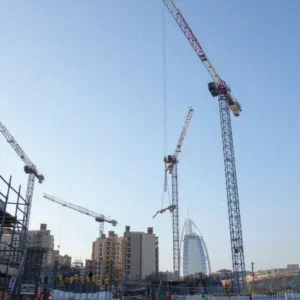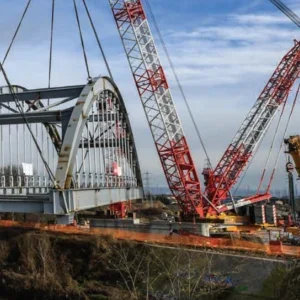A more clearly defined direction is emerging for German loader crane and excavator manufacturer Atlas Weyhausen. When Walter Eder’s Munich-based Eder Group took a majority shareholding in the middle of 1999, rumours were rife that the crane operation would be sold since Eder Group was an excavator business. Atlas’s management acknowledges that this was a distinct possibility but things have changed, they say, following a review of all aspects of the company by Eder. It was found that the crane sector was a profitable business with a good reputation.
According to Atlas Weyhausen’s marketing manager Günter Steinbrecher, Eder plans to build on the established Atlas Weyhausen brand name and make it once again a world leader in the loader market. “The mission of the group under Herr Eder’s governance, is to grow organically and via acquisition in its chosen core sectors,” Steinbrecher says.
In the loader crane market Atlas claims to be number three in Europe (after Hiab and Palfinger). Where it has manufacturing operations, in the UK and Germany, it claims to be market leader and number two respectively. The target is to maintain the UK position, to be back to first place in Germany within three years, and to be up to second place in the rest of Europe in five or six years.
Expect to see new models of both cranes and excavators, and a redesigned corporate image (retaining the Atlas Weyhausen name) at the Bauma exhibition in April. Basic versions will be shown of new crane models, from what will be known as the series two range, and some new ideas are also promised. These are to test customer reaction and involve electronics and radio remote control.
Existing crane models are designated by their capacity rating, i.e. 60 for 60kNm (6tm), followed by .1 denoting series one, to make 60.1. First in the series two range will be four models: the 125.2, 140.2, 170.2, and 190.2, to be followed by more later this year. The range is also to be extended downwards with a 30kNm-rated 30.2 and a 20kNm 20.2. Similarly, the range is to be extended above what is currently the largest model, a 600kNm unit, because although volumes are small it is claimed to be a growing area of the market.
Metamorphosis
Atlas is described as being in the process of making the transition from a traditional company to a modern one. Many new ideas to expand the crane business are promised. To this end, the upper management team has been strengthened and consolidated – changed to the extent that only one member of the pre-takeover team remains, the technical manager, and 90% of the management level below that is also new.
Significant investment has already been made in the manufacturing process, both financially and in terms of new ideas. Throughput, productivity and efficiency have all been improved, the company says, and further measures are planned for this year. A new CAD system is also to be installed in the drive to reduce time to market. Even the possibility of a totally new plant has not been ruled out, according to Steinbrecher, but output must first be maximised from what is already available. Improvements in production logistics this year will increase capacity of the existing factories, where the possibility of a 50% increase is claimed. There are plans for double shift working and expanding onto adjoining land which the company owns but has not developed. A budget of DM3.5m ($1.7m) has been earmarked to meet new production targets.
Lean production methods are to figure strongly. At the UK factory in Scotland, inventory has already been reduced by 50% and there is still further to go, approaching a just in time system, according to Steve Francis, general manager of the UK operation Atlas Hydraulic Loaders.
There is potential for greater standardisation of parts and production while maintaining flexibility, Steinbrecher says. An example of this, he says, is for the largest extension section on a small crane model to be the same component as the smallest extension on a larger model. Atlas has used this modular approach for many years, but with 50% of its cranes being sold as non-standard models, the company sees scope to expand on it further.
Another big development area is training employees and representatives, both in Germany and the UK. Expansion and renovation of the existing training facilities is well under way at the Ganderkesee excavator production site in Germany, where 1,500 trainees a year already attend courses run by five Atlas staff. Authorised dealers must send their service staff at least every three years otherwise they lose their certification.
The distribution network is also to be expanded, generally with more independent dealers rather than wholly owned subsidiaries. Atlas prefers to have a subsidiary where market share is high, such as in the UK where about 50% is claimed, but where market share is lower, independent dealers are preferred.
Investment in the UK includes a new purpose-built regional crane service depot in Bicester, to cover the Midlands and the south of England. This facility opened in December 2000. The main depot in Bradford has a redeveloped spare parts facility and workshop, with new office, training and conference facilities. The number of field service engineers is being increased from 70 to about 90.






